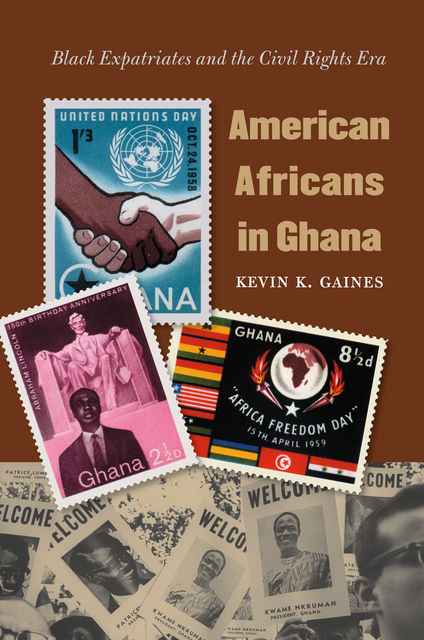We use cookies to improve the Bookmate website experience and our recommendations.
To learn more, please read our Cookie Policy.
To learn more, please read our Cookie Policy.
Accept All Cookies
Cookie Settings

Read in our apps:
iOS
·Android
Kevin K. Gaines
American Africans in Ghana
Notify me when the book’s added
Impression
Add to shelf
Already read
Report an error in the book
Share
Facebook
Twitter
Copy link
To read this book, upload an EPUB or FB2 file to Bookmate. How do I upload a book?
- About
- Readers1
In 1957 Ghana became one of the first sub-Saharan African nations to gain independence from colonial rule. Over the next decade, hundreds of African Americans--including Martin Luther King Jr., George Padmore, Malcolm X, Maya Angelou, Richard Wright, Pauli Murray, and Muhammad Ali--visited or settled in Ghana. Kevin K. Gaines explains what attracted these Americans to Ghana and how their new community was shaped by the convergence of the Cold War, the rise of the U.S. civil rights movement, and the decolonization of Africa. Kwame Nkrumah, Ghana's president, posed a direct challenge to U.S. hegemony by promoting a vision of African liberation, continental unity, and West Indian federation. Although the number of African American expatriates in Ghana was small, in espousing a transnational American citizenship defined by solidarities with African peoples, these activists along with their allies in the United States waged a fundamental, if largely forgotten, struggle over the meaning and content of the cornerstone of American citizenship--the right to vote--conferred on African Americans by civil rights reform legislation.<!--copy for pb cover:<br/>When the West African nation of Ghana gained its independence from British colonial rule in 1957, people of African descent the world over celebrated the new nation as a beacon for their aspirations for freedom and <span class="nobr"><span class="nobr"><span class="nobr"><span class="nobr"><span class="nobr"><span class="nobr"><span class="nobr">self-determination</span></span></span></span></span></span></span>. Over the next decade, hundreds of African Americans--including Martin Luther King Jr., George Padmore, W. E. B. Du Bois, Malcolm X, Maya Angelou, Richard Wright, Pauli Murray, C. L. R. James, and Muhammad Ali--visited or settled in Ghana. Kevin K. Gaines explains what attracted these expatriates to Ghana and how their new community was shaped by the convergence of the Cold War, the rise of the U.S. civil rights movement, and the decolonization of Africa. <br/>-->
more
This book is currently unavailable
576 printed pages
- Original publication
- 2012
- Publication year
- 2012
Have you already read it? How did you like it?
👍👎
fb2epub
Drag & drop your files
(not more than 5 at once)

